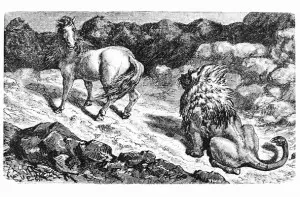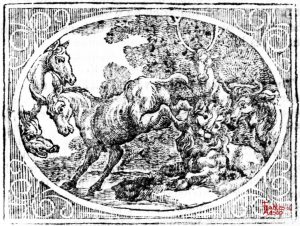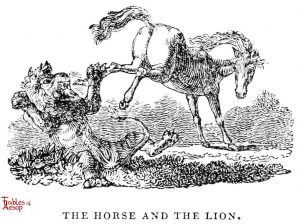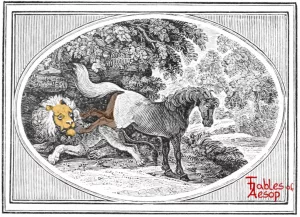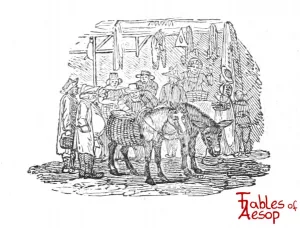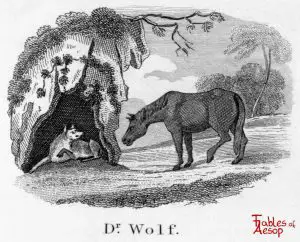A Lion wanted a Horse for a meal. He tried taking the part of a doctor at a school. When the Horse showed up he saw through the sham and escaped by kicking.
Fooling those trying to fool you is beneficial.

JBR Collection
A Lion, who had got old and infirm, saw a fine plump Nag, and longed for a bit of him. Knowing that the animal would prove too fleet for him in the chase, he had recourse to artifice. He gave out to all the beasts that, having spent many years in studying physic, he was now prepared to heal any malady or distemper with which they might be afflicted. He hoped by that means to get admittance among them, and so find a chance of gratifying his appetite. The Horse, who had doubts of the Lion’s honesty, came up limping, pretending that he had run a thorn into one of his hind feet, which gave him great pain. The Lion asked that the foot might be shown to him, and pored over it with a mock earnest air. The Horse, slyly looking round, saw that he was preparing to spring, and vigorously sending out both his heels at once, gave the Lion such a kick in the face, that it laid him stunned and sprawling upon the ground. Then laughing at the success of his trick, he trotted merrily away.

L’Estrange version
There was an old hungry lion would fain have been dealing with a piece of good horse-flesh that he had in his eye; but the nag he thought would be too fleet for him, unless he could supply the want of heels by artifice and address. He puts himself into the garb, and habit of a professor of physick, and according to the humour of the world, sets up for a doctor of the college. Under this pretext, he lets fall a word or two by way of discourse, upon the subject of his trade; but the horse smelt him out, and presently a crotchet came in his head how he might countermine him. I got a thorn in my foot t’other day, says the horse, as I was crossing a thicket, and I’m e’en quite lame on’t. Oh, says the new physician, do but hold up your leg a little, and I’ll cure ye immediately. The lion presently puts himself in posture for the office; but the patient was too nimble for his doctor, and so soon as ever he had him fair for his purpose, gave him so terrible a rebuke upon the forehead with his heel, that he laid him at his length, and so got off with a whole skin, before the other could execute his design.
Moral
Harm watch, harm catch, is but according to the common rule of equity and retaliation, and a very warrantable way of deceiving the deceiver.

Samuel Croxall
A LION, seeing a fine plump Nag, had a great mind to eat a bit of him, but knew not which way to get him into his power. At last he bethought himself of this contrivance; he gave out that he was a physician; who, having gained experience by his travels into foreign countries, had made himself capable of curing any sort of malady or distemper, incident to any kind of beast; hoping by this stratagem, to get an easier admittance among cattle, and find an opportunity to execute his design. The Horse, who smoked the matter, was resolved to be even with him; and so humouring the thing, as if he suspected nothing, he prayed the Lion to give him his advice in relation to a thorn he had got in his foot, which had quite lamed him, and gave him great pain and uneasiness. The Lion readily agreed, and desired he might see the foot. Upon which the Horse lifted up one of his hind legs, and while the Lion pretended to be poring earnestly upon the hoof, gave him such a kick in the face as quite stunned him, and left him sprawling upon the ground. In the mean time the horse trotted away, neighing, and laughing merrily at the success of the trick by which he had defeated the purpose of one who intended to have tricked him out of his life.
THE APPLICATION
Though all manner of fraud and tricking is mean, and utterly beneath a man of sense and honour, yet methinks, equity itself allows us to disappoint the deceiver, and to repel craft by cunning. Treachery has something so wicked, and worthy of punishment in its nature, that it deserves to meet with a return of its own kind; an open revenge would be too liberal for it, and nothing matches it but itself. However therefore abominable it is, to be the aggressor in this point, yet it cannot be inconsistent with virtue to counterplot, and to take all manner of advantage against the man who is undermining us.

Thomas Bewick (The Horse and The Lion)
An old Lion, finding that many of the beasts had become too nimble for him, and that he could not come at his prey so readily as before, craftily gave out that he had long studied physic and surgery in foreign countries, and that he could cure every kind of disorder to which the beasts were liable. These professions having been spread abroad, he hoped to get many of the animals to come within his clutches. The Horse seeing through the whole of the scheme, was resolved to be even with him: and so humouring the thing as if he suspected nothing, he feigned himself to be in great pain from a wound in his foot, and limping up to the Lion, he begged he would examine the part and administer relief. The Lion, though intent only upon making a good meal of horse-flesh, begged the Horse to hold up his foot that he might see it: this was no sooner done, than the Horse gave him so violent a blow on the nose, as quite stunned him, and scampered off, neighing at the success of a trick, which had defeated the purpose of one who intended to have tricked him out of his life.
APPLICATION.
We ought never to put trust in the fair words and pretensions of those who have both an interest and inclination to ruin us; and where we find foul play thus intended against us, it is not in the nature of things to expect that we should not, if we can, turn the tables upon the plotters. Treachery has something so wicked and worthy of punishment in its nature, that it deserves to meet with a return of its own kind. An open revenge is too liberal for it, and nothing matches it but itself. Though a man of sense and honour will always view tricking and fraud of all kinds as mean and beneath him, and will despise setting such an example, yet it cannot be inconsistent with virtue to counteract the schemes of those who are taking all manner of undue advantages, and hatching wicked plots to undermine us.
[Note: A similar fable with a Wolf instead of a Lion is given in rhyme in the Jefferys Taylor book. I’ve included it here instead of making it a page of its own.]

Jefferys Taylor (Doctor Wolf)
A WOLF, grown too old for the chase, it should seem,
To accomplish his ends tried the following scheme.
He gave out that he was an able physician;
Had studied diseases as well as nutrition;
Could amputate either at shoulder or knee,
And only demanded the limb as his fee;
But that, he remark’d, was but seldom required,
As bleeding would have the effect he desired.
So from five in the morning each day until ten,
Was the time that he fix’d, to be seen at his den.
Then many who thought themselves rather unwell,
Repair’d to the Doctor, their symptoms to tell.
And thus far is certain, that none of them all
Had the smallest return of disorder at all.
Said a fox, “There’s one thing that looks odd, to be sure,
It is Doctor Wolf’s practice to kill or to cure;
But I should be glad to be told, I must own,
Before I apply, which of those he has done.”
“Thank you, friend,” said a horse, “for your prudent remark,
I’m afraid that till now we have been in the dark;
But I’ll sift his intentions, and if they are ill,
I will give him a tooth of his own for a pill.”
So saying, the horse trotted off at full speed,
To request the advice he pretended to need;
Who had scarcely arrived, when the bones in the place
Soon convinced him the fox had judged right in this case.
So without more ado he went up to the brute,
And just begg’d him to look at a thorn in his foot;
Then while the wolf look’d at his hoof, you must know,
The horse kick’d all his teeth down his throat at blow.
And then calling aloud to his friends for assistance.
The poor toothless beast, who could make no resistance,
Was directly despatch’d, without trial or jury,
To the infinite joy of the beasts, I assure ye.
I do not profess to commend the old horse
For the steps that he took in this business, of course;
Yet this I may say, and be perfectly fair,
From the fate of the wolf, let impostors beware.
[Note: In the Perry index this fable is matched with The Ass and The Wolf.]
Perry #187
